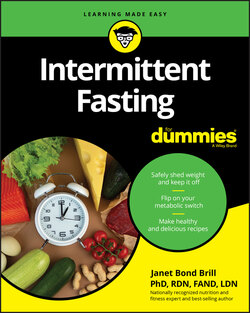Читать книгу Intermittent Fasting For Dummies - Janet Bond Brill - Страница 14
Recognizing the nuts and bolts of intermittent fasting
ОглавлениеHere are the key principles of intermittent fasting lifestyle methods:
All intermittent fasts restrict eating and drinking for set, short periods of time. Every method of intermittent fasting outlined in Part 3 has feasting and fasting periods that vary, depending on the regimen.
The intermittent fasting approach involves alternating periods of eating and fasting. These time periods differ depending on the variation of intermittent fasting, so you choose the method that works best for your lifestyle.
All intermittent fasting protocols are safe and effective for healthy individuals. Each of the methods in Part 3 are safe and have been shown to improve a person’s health and well-being, if practiced correctly.
All intermittent fasting protocols have certain rules you must follow during your fasting window. These steps include drinking plentiful amounts of water, black coffee, tea, and any other non-caloric beverage during your fasting window; just no solid foods allowed. Make sure to stay hydrated during your intermittent fasting periods.
All intermittent fasting protocols prohibit you from eating excessive amounts of junk food during your eating windows. This habit will negate the many benefits of intermittent fasting. The biggest mistake people make is eating too much and eating unhealthy foods during their eating periods.
Intermittent fasting can be practiced for health and fitness and not necessarily for weight loss. Although weight loss is one of the most common reasons for trying intermittent fasting, many people choose to get leaner and fitter and tap into the numerous health benefits intermittent fasting provides without the goal of losing weight. In fact, some follow an intermittent fasting program with the primary goal of gaining muscle weight and losing body fat.
Although intermittent fasting is a healthy choice for some, for others, it can be dangerous. Several groups of people who absolutely should not fast include the following:
Pregnant or lactating women
Individuals who have eating disorders
Individuals with type 1 or type 2 diabetes unless working with their healthcare professional (physicians must be consulted if you have any underlying chronic disease)
Individuals using medications that they must take with food, unless working with their physician
High-level endurance athletes
Elderly individuals with balance issues
Children
Chapter 7 discusses in greater detail who should and shouldn’t follow an intermittent fasting plan.
